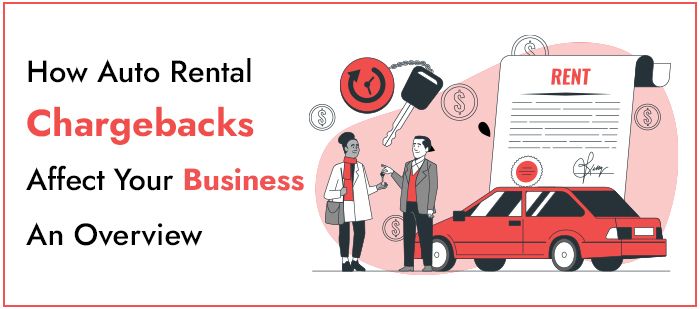
Auto Rental Chargebacks are an increasingly common problem for businesses that rent vehicles. This type of chargeback occurs when a customer makes a purchase with their credit card and then disputes the charge after they’ve received the rental car. As a business owner, it’s important to be aware of how these chargebacks can affect your bottom line and what you can do to protect yourself. In this blog post, we will provide an overview of Auto Rental Chargebacks and discuss how they can affect your business.
What are Auto Rental Chargebacks?
Auto rental chargebacks refer to the reversal of a payment made by a customer for a rental vehicle. This can occur when the customer disputes the charges, claiming that the rental company did not provide the agreed-upon services or that the charges were unauthorized.
Chargebacks can be a major concern for auto rental businesses as they can result in financial losses and damage to their reputation. When a chargeback is initiated, the funds are returned to the customer and the business is responsible for covering the chargeback fees.
There are several common reasons for auto rental chargebacks, including billing discrepancies, dissatisfaction with the rental experience, and fraudulent activity. It is important for rental companies to closely monitor their transactions and address any issues promptly to avoid chargebacks.
To reduce the risk of chargebacks, auto rental businesses can implement certain measures. These may include improving communication with customers, ensuring accurate billing, and providing clear and transparent policies. Additionally, implementing fraud detection and prevention measures can help identify and prevent fraudulent activities.
![]()
Email us anytime!
Email customer service 24/7
![]()
Call us anytime!
Reach customer care 24/7 at +1 (888) 901-8653
In dealing with auto rental chargebacks, it is important for businesses to have effective policies and procedures in place. This may include having a dedicated team to handle chargeback disputes, maintaining detailed records and documentation, and working closely with payment processors and financial institutions.
By understanding what auto rental chargebacks are and taking proactive measures to prevent and manage them, businesses can minimize their impact and ensure a positive rental experience for their customers.
Some Related Blogs
- How to Recognize and Report BOPIS Fraud Attempts
- Avoid Headaches with Chargeback Prevention Alerts
- Proven Chargeback Management Solutions | Chargeback Expertz
- What is Billing Descriptors and What They Mean for Your Bill
The Impact of Auto Rental Chargebacks on Businesses
Auto Rental Chargebacks can have a significant impact on businesses in the industry. These chargebacks occur when a customer disputes a charge on their credit card statement related to a rental transaction. The chargeback process allows the customer to receive a refund while the business is responsible for the disputed amount.
One of the major impacts of Auto Rental Chargebacks is the financial loss for the business. Not only does the business lose the revenue from the disputed transaction, but they may also incur additional fees and penalties associated with the chargeback process. This can add up to significant financial losses, especially for small and medium-sized rental companies.
Furthermore, Auto Rental Chargebacks can also damage a business’s reputation. When customers experience issues or discrepancies with their rental transactions and resort to chargebacks, it reflects poorly on the business’s reliability and trustworthiness. This can lead to negative reviews and word-of-mouth, resulting in a decrease in future bookings and customers choosing competitors instead.
Lastly, the time and resources required to manage Auto Rental Chargebacks can also have an impact on businesses. Dealing with the chargeback process, providing evidence and documentation, and disputing invalid chargebacks can be time-consuming and costly. This diverts attention and resources away from other important business operations, potentially hindering growth and success.
Overall, the impact of Auto Rental Chargebacks on businesses is multi-faceted, including financial loss, damage to reputation, and a strain on resources. It is crucial for businesses in the auto rental industry to understand and proactively address the common reasons for chargebacks to minimize their impact and protect their business.
Common Reasons for Auto Rental Chargebacks
Auto rental chargebacks occur when a customer disputes a charge made to their credit card for a rental vehicle. There are several common reasons why these chargebacks occur, and understanding them can help businesses take steps to prevent them.
One common reason for auto rental chargebacks is fraud. In some cases, customers may claim that their credit card information was stolen or that they never made the rental transaction. This can be a significant problem for businesses, as chargebacks can result in the loss of both the rental fees and the cost of the vehicle itself.
Another reason for auto rental chargebacks is dissatisfaction with the service or vehicle provided. Customers may dispute the charge if they feel that the vehicle was not in good condition, if they experienced poor customer service, or if they were charged additional fees that they were not made aware of.
Lastly, misunderstandings or miscommunications can also lead to chargebacks. For example, a customer may dispute a charge if they were not clearly informed about the rental terms and conditions, or if there was a discrepancy between the advertised price and the actual charge.
To minimize the occurrence of auto rental chargebacks, businesses should ensure that they have strong fraud prevention measures in place, provide excellent customer service, and clearly communicate all rental terms and conditions. By addressing these common reasons for chargebacks, businesses can protect their reputation and reduce financial losses.
How to Reduce Auto Rental Chargebacks
Auto rental chargebacks can have a significant impact on your business’s bottom line. Luckily, there are steps you can take to minimize the occurrence of chargebacks and protect your business.
First and foremost, ensure clear communication with your customers. Provide detailed information about your rental policies, fees, and any potential charges that may apply. Clearly state the terms and conditions of the rental agreement, including any penalties for late returns or damages. This will help manage customer expectations and reduce the likelihood of disputes and chargebacks.
Implement a thorough inspection process for your vehicles before and after each rental. Take detailed photographs or videos of the vehicle’s condition and make sure both parties agree on any existing damages or issues. This documentation will serve as evidence in case of disputes and can help prevent unwarranted chargebacks.
Consider implementing a strong customer service policy. Train your staff to provide exceptional customer service and handle any issues or complaints promptly and efficiently. Resolving customer concerns in a timely manner can prevent them from escalating into chargebacks.
Finally, consider utilizing fraud prevention tools and technologies. Implement a robust verification process to authenticate the customer’s identity and credit card information. This can help detect and prevent fraudulent transactions, ultimately reducing the risk of chargebacks.
Reducing auto rental chargebacks requires proactive measures, clear communication, and attention to detail. By following these steps, you can minimize the occurrence of chargebacks and protect your business from financial losses.
Dealing with Auto Rental Chargebacks: Best Practices
When it comes to dealing with Auto Rental Chargebacks, there are some best practices that can help minimize the impact on your business. Firstly, ensure that your rental agreement is clear and concise, outlining all terms and conditions. Communicate with customers throughout the rental process to avoid any misunderstandings.
Keep thorough documentation of all transactions, including photos and videos of the vehicle’s condition before and after rental. Respond promptly to any chargeback disputes and provide evidence to support your case. Finally, consider implementing a fraud detection system to flag suspicious transactions and prevent future chargebacks.


